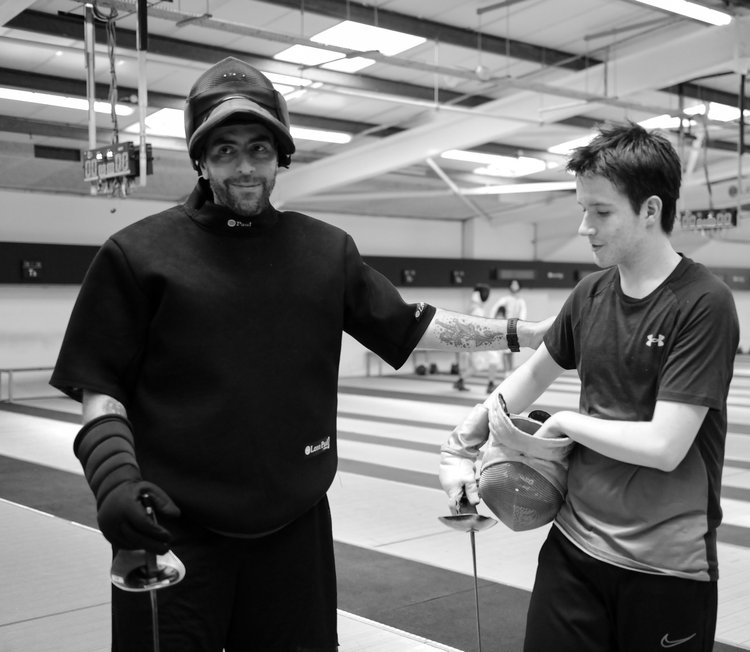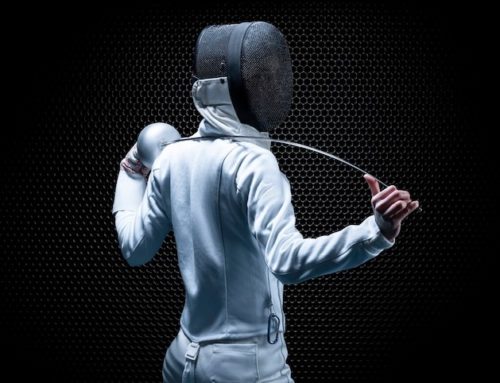Fencing is not just a sport; it’s an art form that combines agility, strategy, and grace. When it comes to learning and mastering this captivating sport, there’s no better way to sharpen and improve your skills than the personalized guidance of one-on-one lessons, in other words, private lessons. In this blog post, I’ll explain the importance of one-on-one lessons and how they can help you unlock your full potential on the fencing piste.
The terms “one-on-one lessons” and “private lessons” are often used interchangeably and essentially refer to the same concept: individualized instruction with a dedicated coach or instructor. Whether you prefer to call them one-on-one or private lessons, the key idea remains the same: a personalized learning experience focused solely on you and your specific needs, goals, and skill development. I like to stick with “one-on-one lessons” because it’s more common in Great Britain’s fencing terminology.
One-on-one lessons are essential in teaching sports like fencing, where individualized instruction can significantly impact skill development, technique refinement, and overall performance. They help athletes to receive focused instruction and repetitive training on their technique, footwork, strategy, mental approach, and match play. Besides fencing, we often see one-on-one lessons in tennis, golf, martial arts, and boxing.
When you start your fencing journey, you might face different alternatives. Joining group sessions is usually the first step into fencing. In general, one-on-one lessons are offered as an option on top of these group sessions at an extra cost. You might find it strange to invest additional time and money in one-on-one lessons in sports. Still, it is the same as the process in academic life, where people go to schools to learn and hire tutors to learn better.
Both group sessions and one-on-one lessons play a crucial role in learning and mastering fencing, and they are inseparable from each other. A fencer’s progression and potential will be limited if one of them is missing. Group sessions allow teaching techniques and strategies through pair exercises and, most importantly, try them on the piste by sparring. However, due to the coach’s individualized involvement and instruction, there is no better tool than one-on-one lessons to teach and refine proper fencing techniques.
Learning correct techniques in fencing is of utmost importance for several reasons:
- Proper technique maximizes performance potential. By executing movements and actions precisely and efficiently, fencers can optimize their power, speed, and accuracy, improving their results and achievements.
- Correct techniques minimize the risk of injuries. Fencing involves repetitive and demanding movements, and incorrect forms can strain the body excessively, leading to injuries and long-term damage. By mastering proper techniques, fencers can reduce the likelihood of injuries and ensure long-term athletic longevity.
- Learning correct techniques lays a strong foundation for skill progression. Proper techniques serve as building blocks for advanced manoeuvres and strategies. Fencers can progress to more complex movements, tactics, and game plans by focusing on fundamental skills and developing sound techniques.
- Correct techniques promote efficient and enjoyable participation. When fencers have a solid grasp of the proper techniques, they can engage in fencing with confidence and enjoyment. Correct techniques enhance fluidity, control, and overall proficiency, allowing fencers to fully immerse themselves in the activity and experience the joy and fulfilment that fencing can bring.
This is why, for many years, I have offered beginners one-on-one lessons as a prerequisite for joining group sessions in the fencing programs I run. This method, which consists of 8 to 12 one-on-one lessons conducted before training in a group, proved itself with many successful fencers who took this path at the beginning of their fencing journey. These lessons help every beginner have the most out of a good foundation in a very short time. Eventually, this method tremendously increases the potential of becoming a better and more successful fencer, yet an enjoyable future in fencing.
After this beginning stage, I recommend participating in group sessions and benefiting from one-on-one lessons. Whether you are a beginner, intermediate, or advanced fencer, you need one-on-one lessons as a part of your training regime throughout your fencing career. Generally speaking, they help fencers refine their forms, techniques, sparring skills, defensive and offensive strategies, and all other fencing-specific needs. Trust me! One-on-one lessons will always be the most effective tool to unlock your full potential.
One of the most significant advantages of one-on-one lessons is the individualized attention of a dedicated coach. Unlike group lessons, where the instructor’s attention is divided, one-on-one lessons provide an exclusive learning experience catered to your needs, goals, and skill level. The coach can focus on identifying your strengths and weaknesses, tailor training exercises to suit your learning style, and provide immediate feedback to help you make rapid progress.
One-on-one lessons in fencing are conducted with the coaches’ active physical participation. This means putting the coaching jacket and mask on, drawing the weapon, taking a position facing the fencer, and moving back and forth on the piste for the duration of the lesson to facilitate the fencer’s learning and skill development in various ways. Here are some ways coaches actively engage during these lessons:
Demonstrating Techniques:
Coaches physically show fencing techniques to provide clear visual examples of proper form, execution, and timing. By showcasing the techniques themselves, coaches help fencers better understand the nuances and intricacies of each move.
Correcting Form and Technique:
As fencers practice, coaches closely observe their movements and actively intervene to correct any form or technique errors. They provide immediate feedback and make necessary adjustments, ensuring fencers develop proper habits and mechanics.
Providing Guidance and Instructions:
Coaches actively provide verbal instructions and guidance throughout the lesson. They explain concepts, tactics, and strategies, offering insights into effectively approaching different situations and opponents.
Through active participation, coaches must ensure that one-on-one lessons are dynamic, informative, and tailored to the fencer’s needs. Besides the technical and strategic requirements of fencing, these lessons also bring many other benefits to the training environment. They provide guidance, corrections, and motivation, creating a supportive environment that fosters skill advancement and overall improvement. Let’s take a closer look into some of the significant advantages of one-on-one lessons:
Tailored Guidance:
One-on-one lessons provide an unparalleled opportunity for coaches to understand your specific needs, strengths, weaknesses, and goals. Unlike group sessions, where the focus is shared, individualized instruction allows for tailored guidance. Your coach can create personalized lesson and training plans, address specific areas for improvement, and provide targeted feedback to help you overcome obstacles and reach your full potential. The attention to detail and customized approach ensures that every minute of your training is optimized for maximum growth.
Accelerated Learning:
You benefit from undivided attention and focused training in a one-on-one setting. The personalized nature of these lessons enables you to progress at your own pace and accelerate your learning. With a coach dedicated solely to your development, you can fine-tune your technique, refine skills, and grasp complex concepts more quickly. The result is a more efficient use of training time, saving you from potential plateaus and facilitating continuous improvement.
Confidence Building:
Sports are as much about mental fortitude as physical ability. One-on-one lessons offer a safe and supportive environment to work on mental aspects such as self-belief, resilience, and overcoming challenges. Your coach is a mentor, guiding you through setbacks, helping you build confidence, and encouraging you to push beyond your limits. With their unwavering support, you’ll develop a strong mindset that extends far beyond the sports arena and empowers you in all areas of life.
Individualized Focus:
Every fencer has a unique style, strengths, and areas for improvement. One-on-one lessons allow your coach to recognize your attributes and tailor training methods accordingly. Whether adjusting your technique, modifying strategies, or exploring new approaches, personalized guidance helps you develop a style that maximizes your strengths while minimizing weaknesses. This individualized focus ensures that your training is customized to suit your specific needs, enabling you to shine and stand out in fencing.
Mentorship and Role Modeling:
In one-on-one lessons, the coach becomes more than just an instructor; they become a mentor and role model. This personal connection fosters trust, respect, and a deeper understanding of your aspirations and challenges. Your coach’s experience and expertise become invaluable resources that you can tap into for advice, inspiration, and guidance. Their presence as a reliable source of support helps you navigate the ups and downs of your sports journey with confidence and determination.
As you can see, one-on-one lessons in fencing offer a transformative experience that goes beyond the boundaries of physical training. Whether you’re a novice looking to take your first steps into the world of fencing or an experienced and aspiring fencer aiming to reach new heights, one-on-one lessons offer unparalleled benefits.
The individualized attention, tailored guidance, accelerated learning, confidence-building, mentorship, and fine-tuning of technique create a powerful synergy that unlocks your full potential and makes one-on-one lessons the ideal choice for those serious about excelling in this captivating sport.
Opportunities presented by one-on-one lessons can profoundly impact your fencing performance, personal growth, and overall satisfaction on your sporting journey. So, what are you waiting for to unlock your full potential? Step into the world of personalized training with one-on-one lessons, and embark on a path of self-discovery, excellence, and achievement in fencing.



